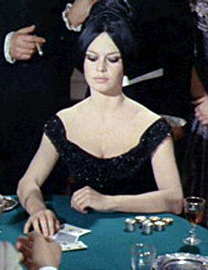|
|
Progress Publishing Co. |
|
|
Poker Overpair |
|
|
Progress Publishing Co. |
|
|
Poker Overpair |

![]()

![]()
Poker Overpair
How to play an overpair in Texas Holdem Poker
*******************************************************************
General rule for playing an overpair in Texas Holdem poker
How to protect an overpair
The issue of correct timing for an overpair protection
An immediate protection of an overpair on the flop
Delayed overpair protection on the turn
*******************************************************************
The general rule for playing a poker overpair
An overpair means that a poker player had a pocket pair before the flop and the rank of his cards is higher than any other card on the flop. When a poker player has an overpair all he has is a weak hand – one pair. One pair is only better than a lone ace. Any other poker hand from two pair to royal flush beats one pair. Since an overpair is such a weak hand it can be easily beaten especially in a multiway pot with 4, 5 and more players involved in the pot. The fewer players are in the pot, the more chances that an overpair will hold all the way to the river and win the pot. An immediate concern for a poker player holding an overpair is to protect his overpair. He can do that by pushing other players out of the pot minimizing the threat and competition from the hands held by other players. The general rule for playing an overpair is to protect it by narrowing the field of the players.
How to protect an overpair in Texas Holdem poker
In order to protect his overpair, a poker player has to bet, raise or check-raise. He can’t simply check (unless he intends to check raise) or call. If nobody has bet in front of him he has to bet. If another player has already bet, he has to raise. If a poker player with an overpair is out of position and his overpair is not of a high rank, he may consider checking first. His plan will be check raising the bet from the late position, made by a player who has raised pre-flop. His goal will be to eliminate at least some poker players between him and the player in the late position.
The issue of correct timing for an overpair protection
Most of the time an overpair protection moves must be done right away on the flop without any delay. Eliminating competition early is just a plain common sense. The more poker players allowed to continue, the more exposed an overpair becomes for possible outdraws by competing hands. However, the texture of the flop and the rank of the overpair cards might affect the timing of an overpair protection. Sometimes, a poker player is justified to postpone his protection till the turn, instead of pulling the trigger on the flop.
An immediate protection of an overpair on the flop
If a poker player has a high rank overpair, he has to play it fast right on the flop most of the time regardless of the texture of the flop. Suppose a poker player has two aces or kings on the flop. If a flop is rank and color coordinated, his overpair faces the threats from possible flush and open-ended straight draws and weak draws like a “gutshot” or small pair draws. It is almost impossible to stop flush and open-ended straight draws on the flop and on the turn. So, a poker player should try to protect his overpair right on the flop by trying to eliminate at least weak draws and narrow the field in the process. At the same time he’ll build the pot and make strong draws more expensive to pursue for other players.
Some poker players are hesitant to raise on the flop when they have a high overpair. The reason is that they are afraid the pot will be too small if the few players will leave the action after the raise. The priority, however, for a poker player with an overpair is to maximize the chances of winning the pot. The maximization of the pot should be considered when a poker player has a lot stronger hands than just an overpair, which can be beaten so often and in so many ways.
Delayed overpair protection on the turn
If a poker player has an overpair on the flop with medium strength cards, then his overpair is vulnerable not only to possible strong and weak draws but also to any hands containing higher cards. If a player has an overpair of two nines, then 5 cards from a10 to an Ace on the turn can kill his hand. In this scenario it makes sense for a poker player with a medium overpair to delay a protection attempt till the turn. If a turn card looks safe (smaller that an overpair cards), then a poker player can raise the bet for protection purposes. A doubled big bet on the turn is a lot stronger deterrent than a doubled small bet on the flop. It will most likely stop the high cards draws as well as a gutshot and small pair draws.
Copyright Progress Publishing Co. shing Co.
Selected References:
| David Sklansky Mason Malmuth Holdem Poker | Phil Hellmuth Jr Play Poker Like the Pros |
| Ed Miller David Sklansky Small Stakes Holdem Poker | Doyle Brunson Super System - A Course in Power Poker |
| David Sklansky The Theory of Poker | Dan Harrington Harrington on Poker |
| Lee Jones Winning Low Limit Texas Holdem Poker | John Vorhaus Killer Poker |
| Ken Warren Ken Warren Teaches Texas Holdem Poker Gide to | Bobby Baldwin Bobby Baldwin's Winning Poker Secrets |
| Tom McEvoy Shane Smith Beat Texas Holdem Poker | T J Cloutier Tom McEvoy Champiomship Texas Holdem Poker |